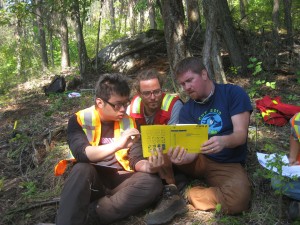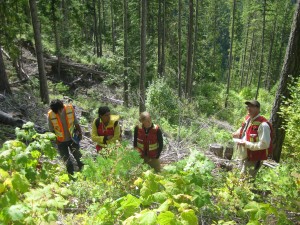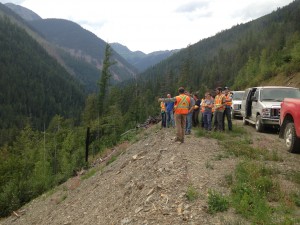FRST 557- Site-level Forest Land Management
Instructors:
Dr. Suzanne Simard suzanne.simard@ubc.ca FSC 3061
Mr. Paul Lawson paul.lawson@ubc.ca MKRF
Ms. Deborah DeLong deborah.delong@ubc.ca FSC 2301
Dr. Richard Hamelin richard.hamelin@ubc.ca FSC 3032
Dr. Allan Carroll allan.carroll@ubc.ca FSC 3034
Calendar Description
Design and implementation of site-level plans that integrate ecological, social and economic components. Includes topics from silviculture, forest operations and forest health. 6 credits.
Course Objectives
Students will learn the theory and practice of site (stand) – level decision making. Students will apply the knowledge gained from classroom instruction and readings to develop a silviculture prescription, operational plan and business plan for a forested site at the UBC Malcolm Knapp Research Forest.
Learning Outcomes
1. Students will know how to diagnose site and stand conditions and assess operability.
2. Students will know how to design site-level plans that integrate ecological, economic and social criteria, and that account for uncertainty.
3. Students will know how to use stand growth and yield and visualization tools to project future stand conditions.
4. Students will understand that site-level decisions occur within the context of landscape-level plans.
5. Students will understand the considerations in choosing appropriate techniques and equipment for implementation of silviculture and harvesting plans.
6. Students will be able to prepare operational and business plans for forest-based activities.
Course Structure
The course will consist of 3 hours of lectures, 8 hours of lab or field based tutorial, and a one-hour seminar each week, along with supplementary readings and exercises. There will be a Saturday field trip during the last week of September, and a one week residential field camp during the last week of October. The site plan exercise will run for the whole term with a set of interim products due at set dates and a final group report and defense. Subjects will be presented by a team of instructors in modules, with Dr. Mitchell acting as the coordinating instructor.
Course Modules
- Silviculture (Siamrd,Larson, DeLong)
- Project Management and Communication (DeLong)
- Operations (Lawson, DeLong)
- Biotic Disturbances (Carroll, Hamelin)
- Site Plan Exercise (Mitchell, DeLong, Hunt, Marshall)
- Weekly seminar (DeLong)
Schedule Updates
See the FRST 557 schedule handout for the general sequence of lectures, tutorials, seminars, quizzes and field trips. Regularly check the MSFM Calendar for updates on seminar topics, guest speakers and other events http://msfm.forestry.ubc.ca/home/calendar-2/
Assignments and Evaluation:
Midterm Quiz on Silviculture Part 1 10%
Forest Health ID Quiz 10%
Operations Exercise 10%
Research Paper Critique 5%
Final Exam 20%
Site Plan Field Defense 10%
Site Plan Report 20%
Site Plan Defense/Professionalism 10%
Professionalism 5%
All members of a group will normally receive the same mark for group components of reports and assignments. If necessary, each member of the group will be asked to summarize their contributions to the project and those of their group mates. Marks may be deducted from the final mark of group members who do not contribute their fair share.
Reports, assignments and defenses will be graded based on the quality of observation, research, integration and argument, along with the state of preparation and delivery. Written documents must be properly proof-read and edited.
Texts
Lectures, readings and resources will be posted on the course website. Here are some optional texts:
Allen, E., Morrison, D. and Wallis, G. 1996. Common tree diseases of British Columbia. Nat. Res. Canada, Can. For. Serv., Pacific Forestry Centre, Victoria, B.C.
Edmonds, R.L., Agee, J.K. and Gara R.I. Forest Health and Protection. McGraw-Hill. 2000.
MacDonald, A.J. 1999. Harvesting Systems and Equipment in British Columbia. (FERIC Handbook HB-12)
Smith, D.M., B.C. Larson, M. Kelty, and P.M.S. Ashton, 1997.The Practice of Silviculture: Applied Forest Ecology, (9th edition), Wiley, Inc. 550p.
Cultivating Forest Stewardship – Learning Resources Website


